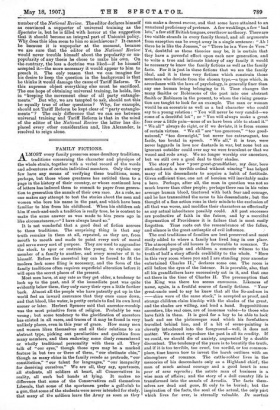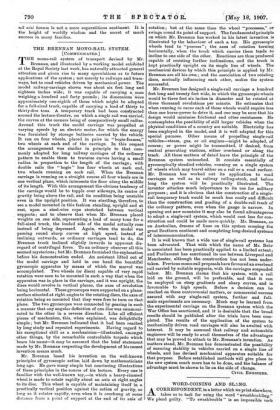FAMILY FICTIONS.
ALMOST every family preserves some desultory traditions, traditions concerning the character and physique of the whole strain, together with a verbal record of the words and adventures of certain individual members. Only the very few have any means of verifying these traditions, none, perhaps, but those whose greatness has entitled them to a page in the history of their country, or whose continued love of letters has induced them to commit to paper from generation to generation the annals of their own race. As a rule, no one makes any attempt to test the stories about the men and women who bore his name in the past, and which have been familiar to him from his childhood. When his children ask him if such-and-such a tradition is really true, he is content to make the same answer as was made to him years ago in like circumstances,—" I have always heard so."
It is not wonderful that a good deal of fiction accrues to these traditions. The surprising thing is that any truth remains in them at all, repeated, as they are, from mouth to mouth and made to point every sort of moral and serve every sort of purpose. They are used to aggrandise the stock, to spur or restrain the young, to explain one member of a family to another, and every member of it to himself. Before the ancestral key can be forced to fit the modern lock some filing is necessary, and the form of the family traditions often requires superficial alteration before it will open the secret places of the present.
Most men have, at any rate as they get older, a tendency to look up to the past, and if the immediate past was quite evidently below them, they only carry their eyes a little further back. Almost all the people who have patently got up in the world feel an inward assurance that they once came down, and that blood, like water, is pretty certain to find its own level sooner or later. Herbert Spencer said that ancestor-worship was the most primitive form of religion. Probably he was wrong ; but some tendency to the glorification of ancestors has existed in all races, and traces of it may be found in very unlikely places, even in this year of grace. How many men and women liken themselves and all their relations to an abstract type, picking out peculiarities and qualities from many members, and then endowing some dimly remembered or wholly traditional personality with them all. They talk of "our eyes," though those eyes may be a marked feature in but two or three of them, "our obstinate chin," though as many chins in the family recede as protrude, "our constitution," "our talent for languages," "our incapacity for deceiving ourselves." We are all, they say, sportsmen, all students, all soldiers at heart, all Conservatives in reality, all such bad hands at lying. It makes no difference that some of the Conservatives call themselves Liberals, that some of the sportsmen prefer a golf-club to a gun, that some of the students were never intended for study, that many of the eoldiers leave the Army as soon as they can make a decent excuse, and that some have attained to an unnatural proficiency of pretence. A few weaklings, a few" bad lots," a few stiff British tongues, overthrow no theory. There are two visible strands in every family thread, and all arguments from exception can be swept away in a single sentence: "Ahi there be is like the Soneses," or "There he is a Pere de Vera." Yet, doubtful as these theories may he, it is certain that they have a powerful effect upon each new generation, and to write a true and intimate history of any family it would be necessary to know the family fictions as well as the family facts. For it is just in these fictions that we see the family ideal, and it is these very fictions which constrain those members who deviate from the chosen type,—a type which, in accordance with the laws of psychology, is generally finer than any one human being belonging to it. Time changes the many Smiths or Robinsons of the past into one abstract Smith or Robinson in the present, to whom the rising generation are taught to look for an example. The man or woman would be an eccentric as well as a bad character who could say to a young relation : "You will never be very candid—we come of adeceitful lot "; or "You will always make a great fuss over a little pain—none of us have been able to stand it." "We all" always do sight, or if we deviate, it is from excess of certain virtues. "We all" are "too generous," "too goodnatured," "too downright," but never too extravagant, too facile, too brutal in speech. "We all," it is true, were never laggards in love nor dastards in war, but none but an ignorant outsider could ever say we were truculent or that we wooed and rode away. We no longer worship our ancestors, but we still owe a good deal to their shades.
The story of how "your great-grandfather, my dear, bore such-and-such a terrible ordeal without wincing" has helped many of his descendants to acquire a habit of fortitude. Given sufficient time, one act of heroism will inevitably make a hero. Perhaps, after all, the man in question was not so much braver than other people; perhaps there ran in his veins average human blood, tinctured with both fear and courage, and he has transmitted the same to his deseendsmts ;, but the thought of a fine action runs in their minds to the exclusion of all that was worse, and modifies their characters as effectually as any actual inheritance possibly could. All past successes are productive of faith in the future, and by a merciful dispensation of Providence it is failure that is most easily forgotten. Time roots out the remembrance of the fallen, and silence is the great antiseptic of evil influence.
The oral traditions of families are best preserved and most easily added to where a family has lived long in one place. The atmosphere of old houses is favourable to romance. To ill-educated people and children a concrete witness to the truth of half a story affords credibility to the whole. "Here in this very room where you and I are standing your ancestor entertained Charles II.," declares some one. The room is still before the eyes of the listener. It is provable, also, that all his grandfathers have successively sat in it, and that one sat there in the time of Charles II. The presumption that the King was there too seems enormous. Likeness of name, again, is a fruitful source of family fictions. "Your great-uncle used to say he knew that all the So-and-sos in —shire were of the same stock," is accepted as proof, and strange children claim kinship with the shades of the great, and the shades are willing, and lend a hand. Supposititious ancestors, like real ones, are of immense value—to those who have faith in them. It is good for a boy to be able to look back and see the picturesque road which his forefathers travelled behind him, and if a bit of scene-painting is cleverly introduced into the foreground—well, it does not matter. We cannot reproduce the past in all its crudity. If we could, we should die of anxiety, augmented by a double discontent. The tendency of the years is to beautify the truth, and if it is too terrible, too cruel, too sordid, or too common. place, time knows how to invest the harsh outlines with an atmosphere of romance. The cattle-robber lives in the memories of his descendants only as a Highland chief; the man of much animal courage and a good heart is sans pear et sans reproehe ; the astute man of business is a wise man of affairs; and the story of a dull country life is transformed into the annals of Arcadia. The facts themselves are dead and gone, fit only to be buried ; but the inspiration of the facts, the soul of the actual, the only part which lives for ever, is eternally valuable. De mortuis nil nisi bosom is not a mere superstitious sentiment. It is the height of worldly wisdom and the secret of much success in many families.







































 Previous page
Previous page